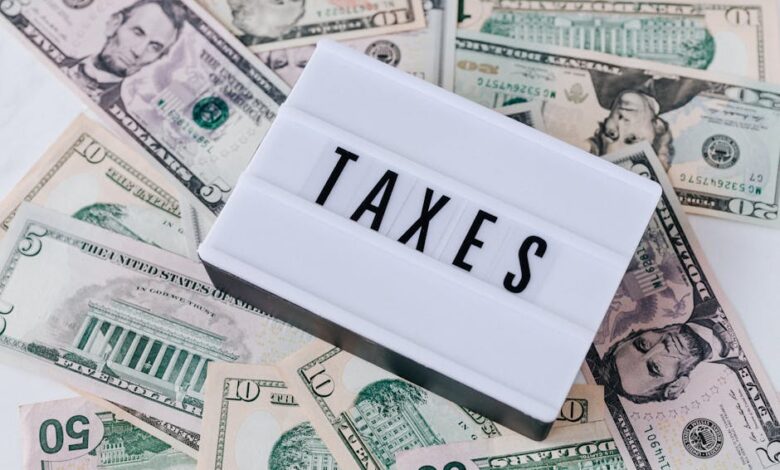Tax Savvy: Strategies for Maximizing Deductions, Navigating Policy Changes, and Future-Proofing Your Finances

In an ever-evolving financial landscape, understanding the intricacies of tax deductions and credits has never been more crucial for both individuals and businesses. As tax policies undergo significant changes, the ability to navigate these shifts can lead to substantial savings and enhanced financial strategies. This article delves into essential strategies for maximizing tax deductions and credits, highlighting the importance of staying informed about policy impacts on financial planning. We will explore effective methods for reducing taxable income through strategic investments and the use of tax-advantaged accounts, which play a vital role in retirement planning. Additionally, we will examine the complexities of international tax laws for those with global investments, as well as the implications of digital currencies on tax reporting. Finally, small business owners will find tailored tips to minimize their tax liabilities in a challenging economic environment. Join us as we unravel the future of tax policy and empower you to make informed decisions that can lead to significant financial benefits.
- 1. Unlocking Savings: Maximizing Tax Deductions and Credits for Individuals and Businesses
- 2. Navigating Change: Understanding the Impact of Tax Policy on Your Financial Strategy
- 3. Investing Wisely: Strategies for Reducing Taxable Income and Leveraging Tax-Advantaged Accounts
1. Unlocking Savings: Maximizing Tax Deductions and Credits for Individuals and Businesses
Maximizing tax deductions and credits is a critical strategy for both individuals and businesses looking to reduce their tax liabilities and unlock potential savings. Tax deductions lower the amount of income that is subject to taxation, while tax credits provide a direct reduction in the amount of tax owed.
For individuals, common deductions include those for mortgage interest, student loan interest, and medical expenses. Additionally, contributions to retirement accounts such as 401(k)s or IRAs can significantly lower taxable income. It’s essential for individuals to keep meticulous records of eligible expenses and consult the latest IRS guidelines to ensure they are taking full advantage of available deductions.
Businesses, on the other hand, can leverage various deductions related to operational expenses, such as rent, utilities, and salaries. The Tax Cuts and Jobs Act introduced provisions that allow for immediate expensing of certain capital investments, enabling businesses to reduce taxable income substantially in the year the investment is made. Moreover, tax credits like the Research and Development (R&D) tax credit can incentivize innovation and offset some of the costs associated with developing new products or services.
Both individuals and businesses should also consider lesser-known deductions and credits. For instance, education expenses, energy-efficient home improvements, and charitable contributions can lead to significant savings if properly claimed. Tax planning strategies, such as bunching deductions or utilizing tax software and professional advice, can further optimize tax outcomes.
Ultimately, maximizing tax deductions and credits requires proactive engagement with the tax code and a thorough understanding of available opportunities, ensuring that both individuals and businesses can unlock substantial savings each tax year.
2. Navigating Change: Understanding the Impact of Tax Policy on Your Financial Strategy
Tax policy changes can significantly influence both individual and business financial strategies. As lawmakers adjust tax codes—whether through new legislation, amendments, or regulatory changes—understanding these impacts becomes crucial for effective financial planning.
For individuals, alterations in tax policy can affect disposable income, influencing decisions related to spending, saving, and investment. For instance, changes in tax brackets or rates can shift the amount of income that is taxable, prompting taxpayers to reconsider their investment strategies or retirement contributions. It's essential to stay informed about these changes, as they may create opportunities for tax savings or necessitate adjustments in budgeting and financial priorities.
Businesses, too, must adapt their financial strategies in response to tax policy changes. Modifications in corporate tax rates, deductions, and credits can affect profitability and cash flow. Companies may need to reassess their capital expenditures or operational structures to optimize tax efficiency. For example, if tax incentives for research and development are expanded, businesses may choose to increase investment in innovation, thereby not only enhancing their market position but also benefiting from favorable tax treatment.
Moreover, tax policy can influence broader economic conditions, which in turn affect individual and corporate financial strategies. Changes that stimulate economic growth may lead to increased consumer spending, while more restrictive tax policies could dampen investment and economic activity. Individuals and businesses must remain agile, continuously evaluating how external tax changes align with their financial goals and adjusting their strategies accordingly.
In summary, navigating the complexities of tax policy requires a proactive approach. Staying informed about potential changes, understanding their implications, and being willing to adapt financial strategies are key components of ensuring that both individuals and businesses can effectively manage their tax liabilities while optimizing their financial outcomes.
3. Investing Wisely: Strategies for Reducing Taxable Income and Leveraging Tax-Advantaged Accounts
Investing wisely is a crucial strategy for reducing taxable income and maximizing the benefits of tax-advantaged accounts. By carefully selecting investments and utilizing specific accounts, individuals can significantly lower their overall tax burden.
One effective approach is to focus on tax-efficient investments, such as municipal bonds, which are often exempt from federal income tax and, in some cases, state taxes. Additionally, favoring long-term investments over short-term trading can also yield tax benefits. Long-term capital gains, which apply to assets held for more than a year, are typically taxed at lower rates than ordinary income or short-term capital gains.
Utilizing tax-advantaged accounts plays a pivotal role in reducing taxable income. Contributions to accounts such as 401(k)s and IRAs are often made pre-tax, which lowers taxable income in the year contributions are made. Traditional IRAs allow for tax-deferred growth, meaning taxes are paid only upon withdrawal, typically in retirement when individuals may be in a lower tax bracket. On the other hand, Roth IRAs offer tax-free withdrawals in retirement, provided certain conditions are met, allowing for tax-free growth on investments made within the account.
In addition to retirement accounts, Health Savings Accounts (HSAs) provide a triple tax advantage: contributions are tax-deductible, growth is tax-free, and withdrawals for qualified medical expenses are also tax-free. This makes HSAs an excellent tool for both health expenses and retirement planning.
Investors should also consider tax-loss harvesting, a strategy where losses from investments can offset gains, reducing overall taxable income. By strategically selling underperforming assets, investors can realize losses that can be used to offset capital gains, thereby minimizing tax liabilities.
In summary, by investing wisely and leveraging tax-advantaged accounts, individuals can effectively reduce their taxable income, enhance their investment growth potential, and secure their financial future. These strategies not only provide immediate tax benefits but also foster long-term financial health.
In conclusion, maximizing tax deductions and credits is an essential strategy for both individuals and businesses seeking to optimize their financial outcomes. As tax policies evolve, it becomes increasingly important to stay informed about their implications and adapt financial strategies accordingly. By investing wisely and utilizing tax-advantaged accounts, individuals can significantly reduce their taxable income while also securing their financial futures.
Moreover, navigating the complexities of international tax laws is crucial for those engaged in global investments, as is understanding the unique challenges posed by emerging digital currencies in tax reporting. For small business owners, implementing proactive measures to minimize tax liabilities can enhance profitability and foster growth.
As we look ahead, the future of tax policy will likely continue to shift in response to economic changes, making it imperative for taxpayers to remain vigilant and adaptable. By embracing these strategies and insights, individuals and businesses can effectively navigate the tax landscape, unlocking potential savings and fostering long-term financial stability.





